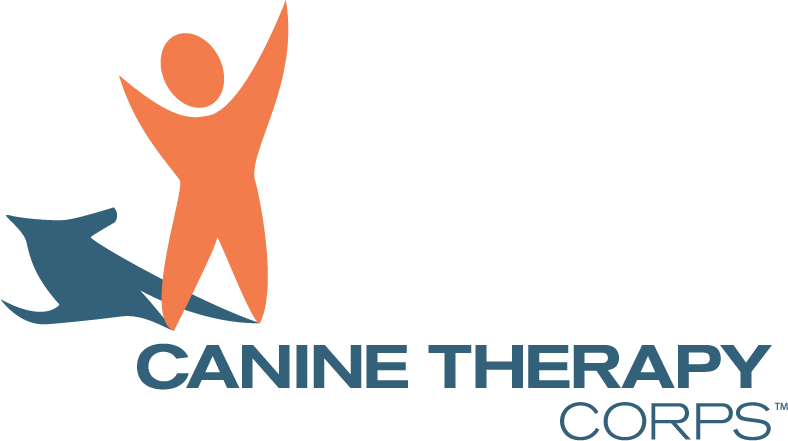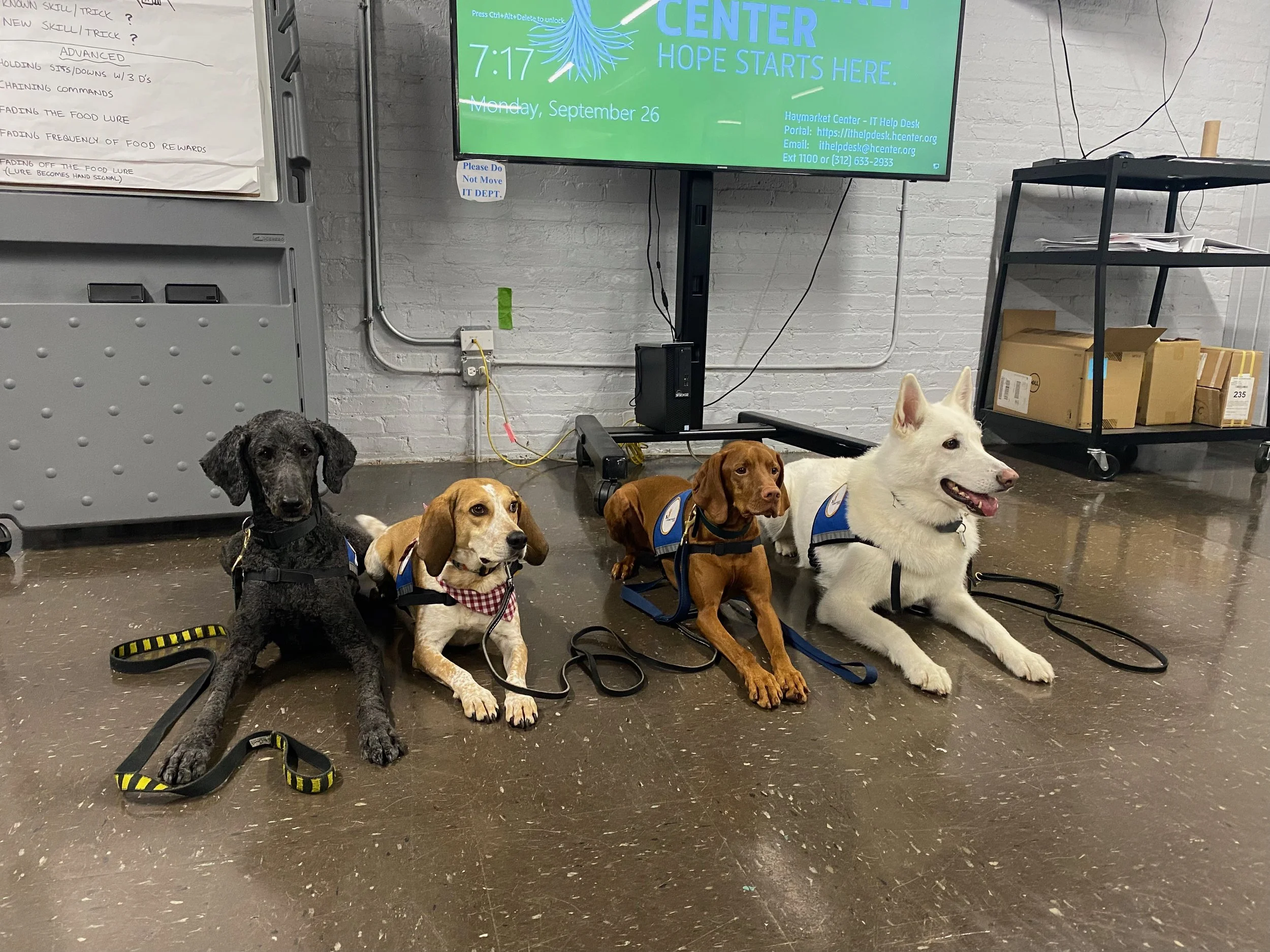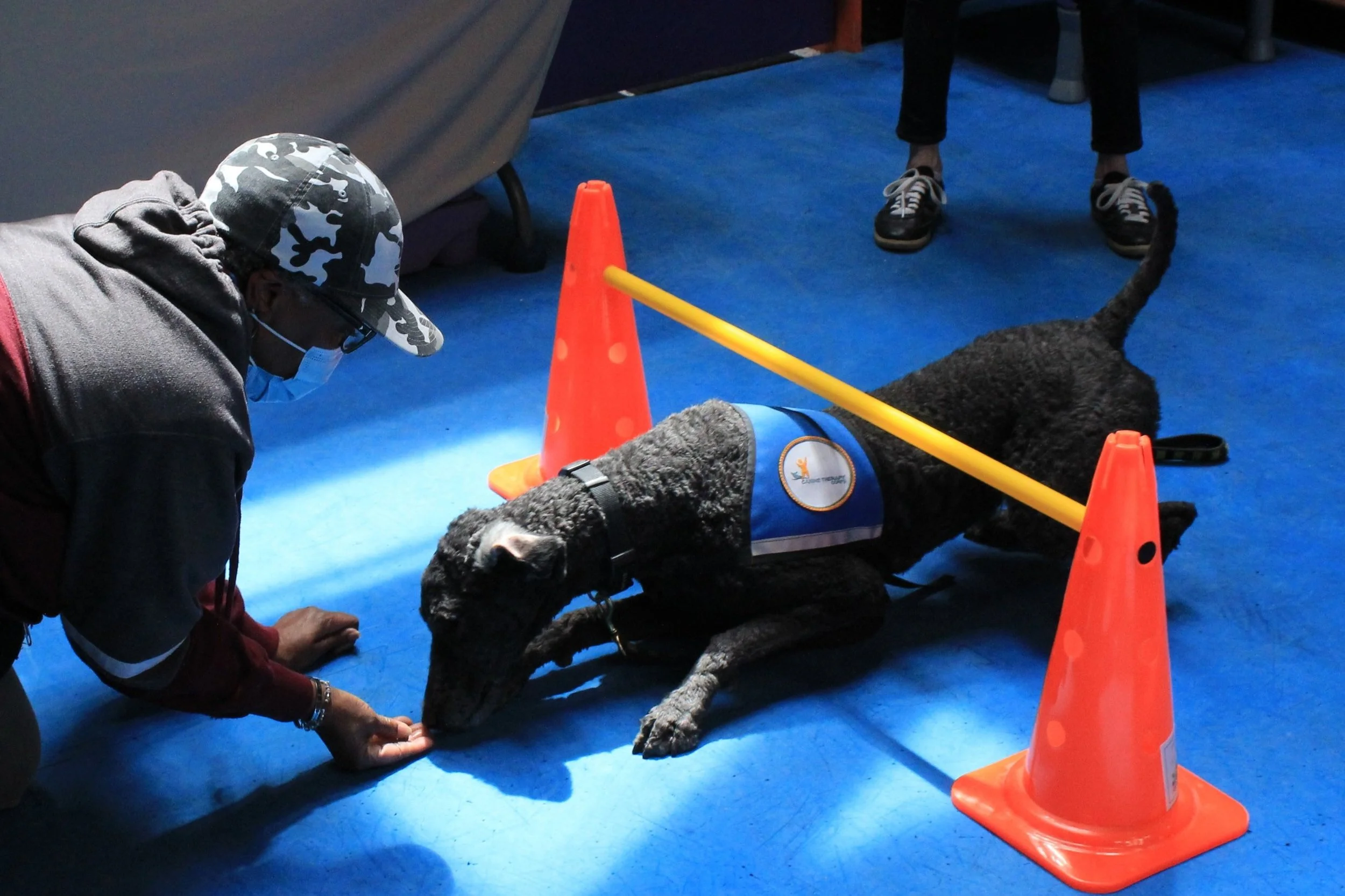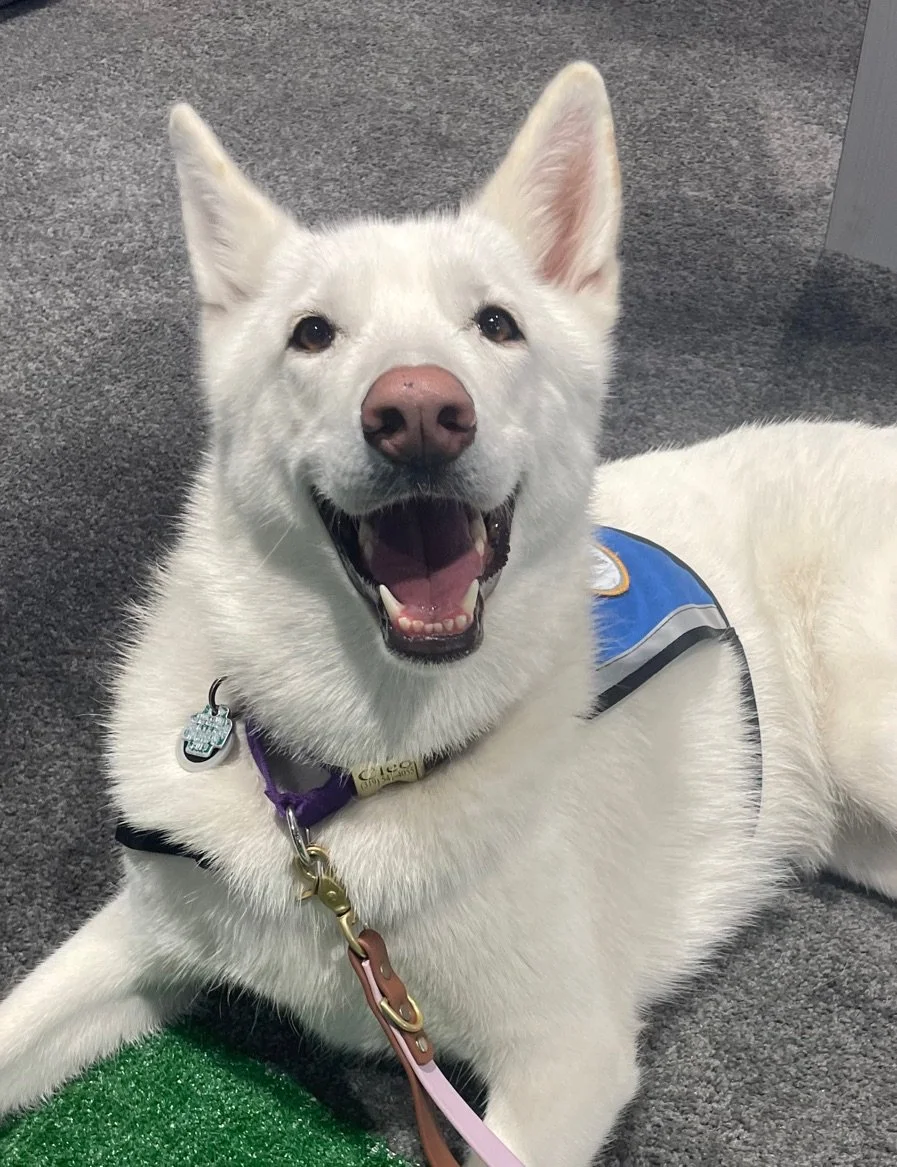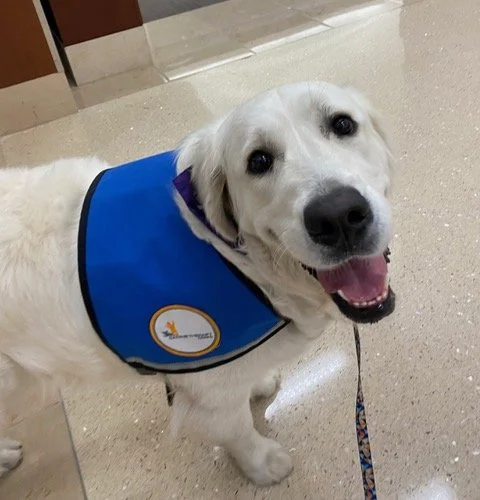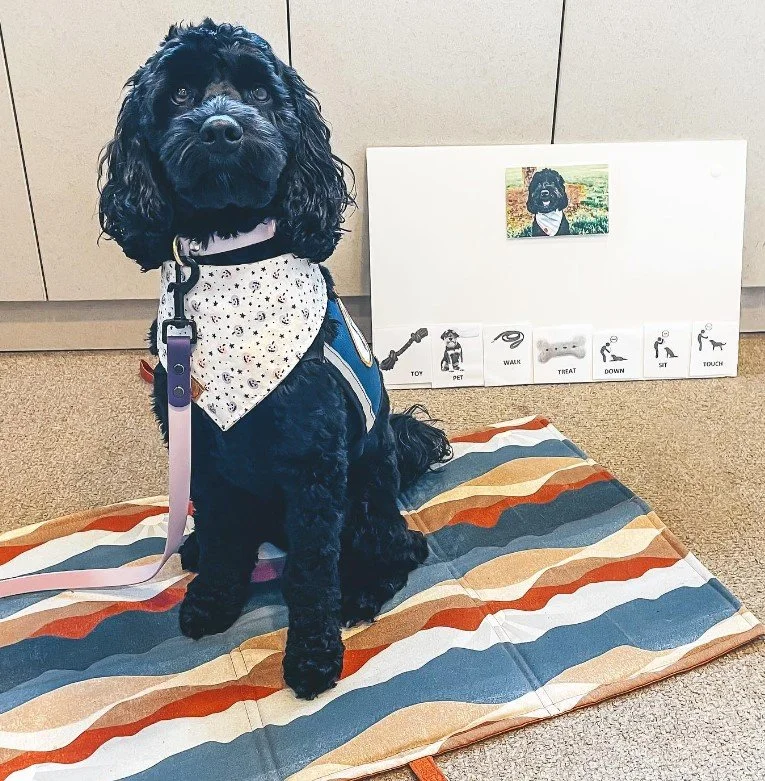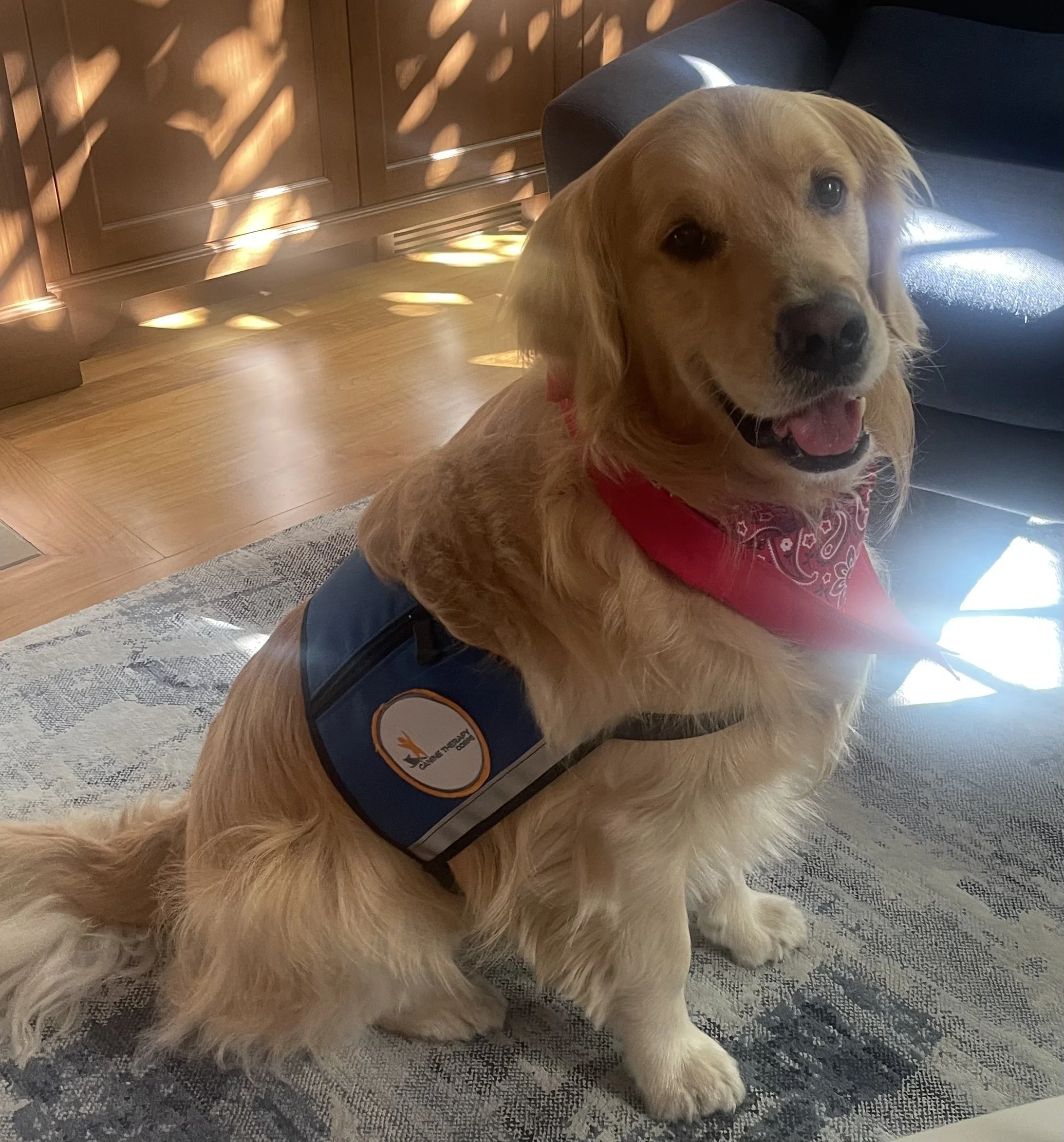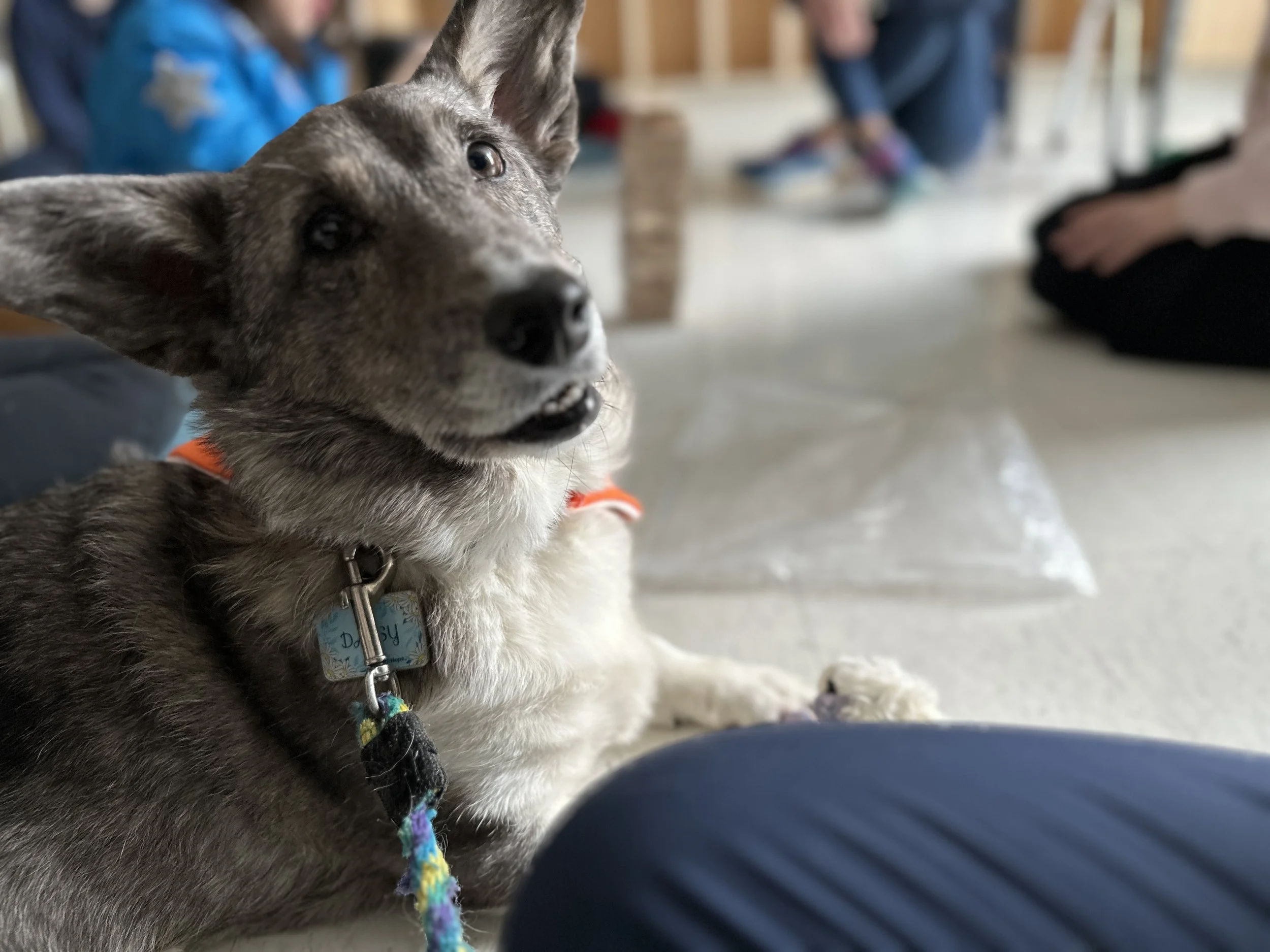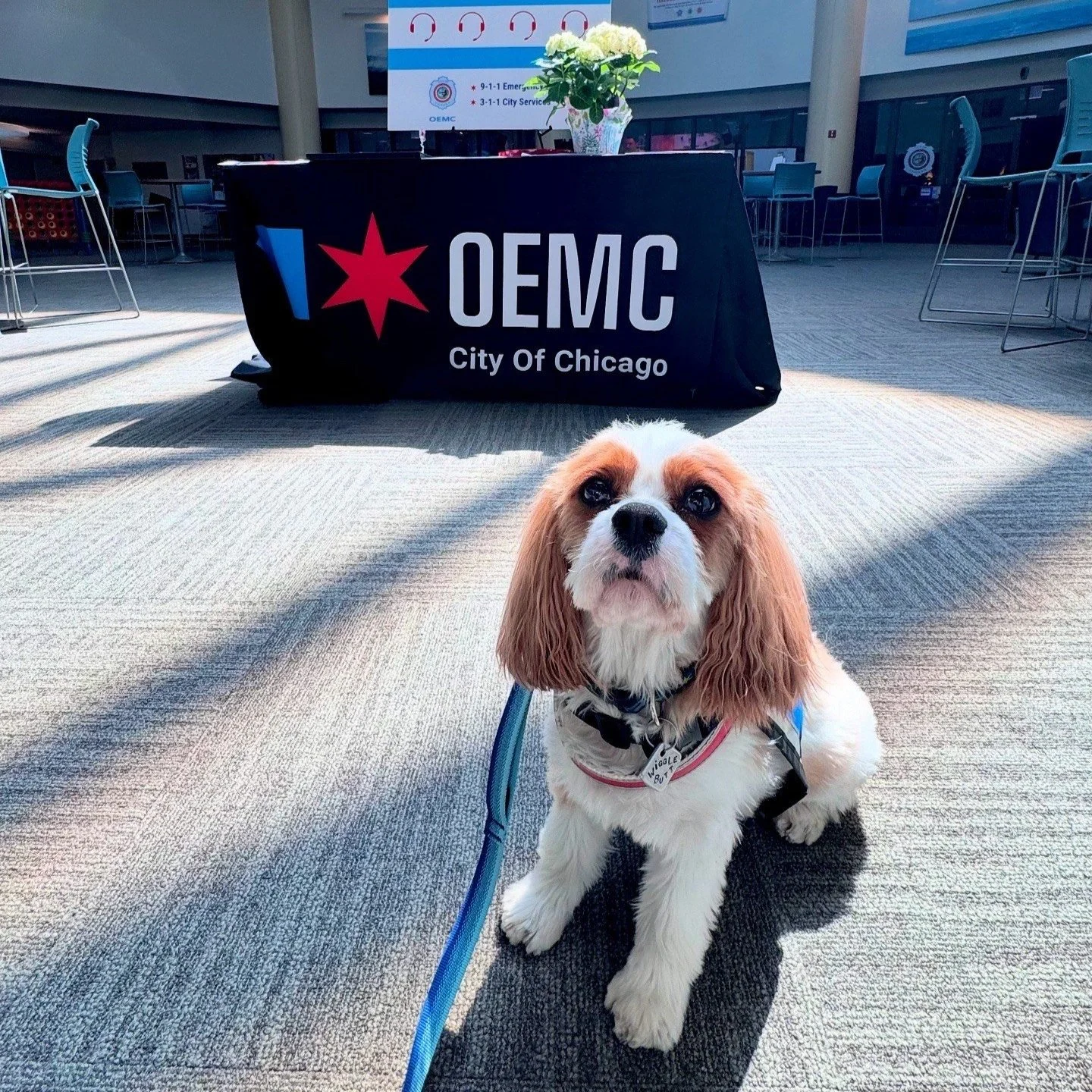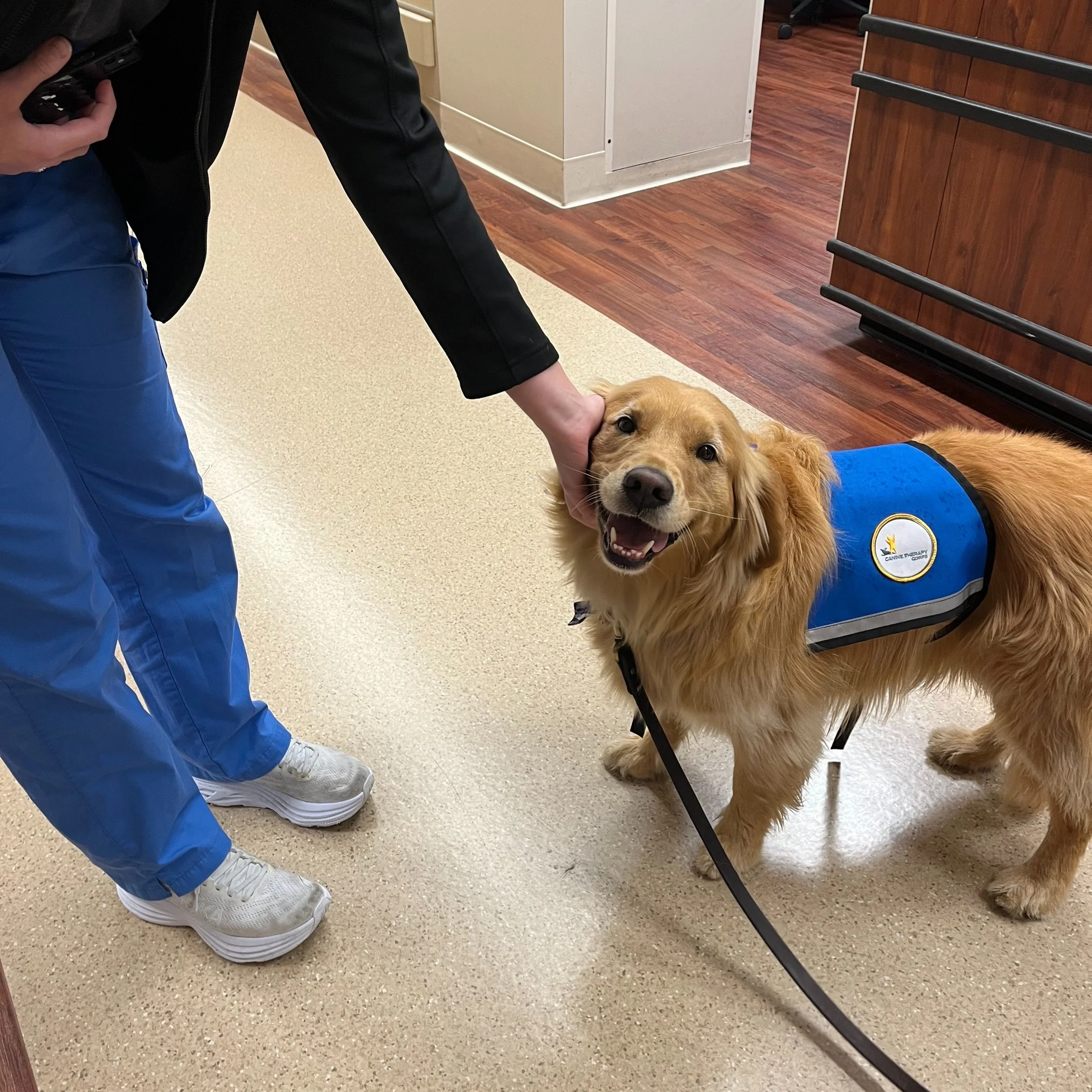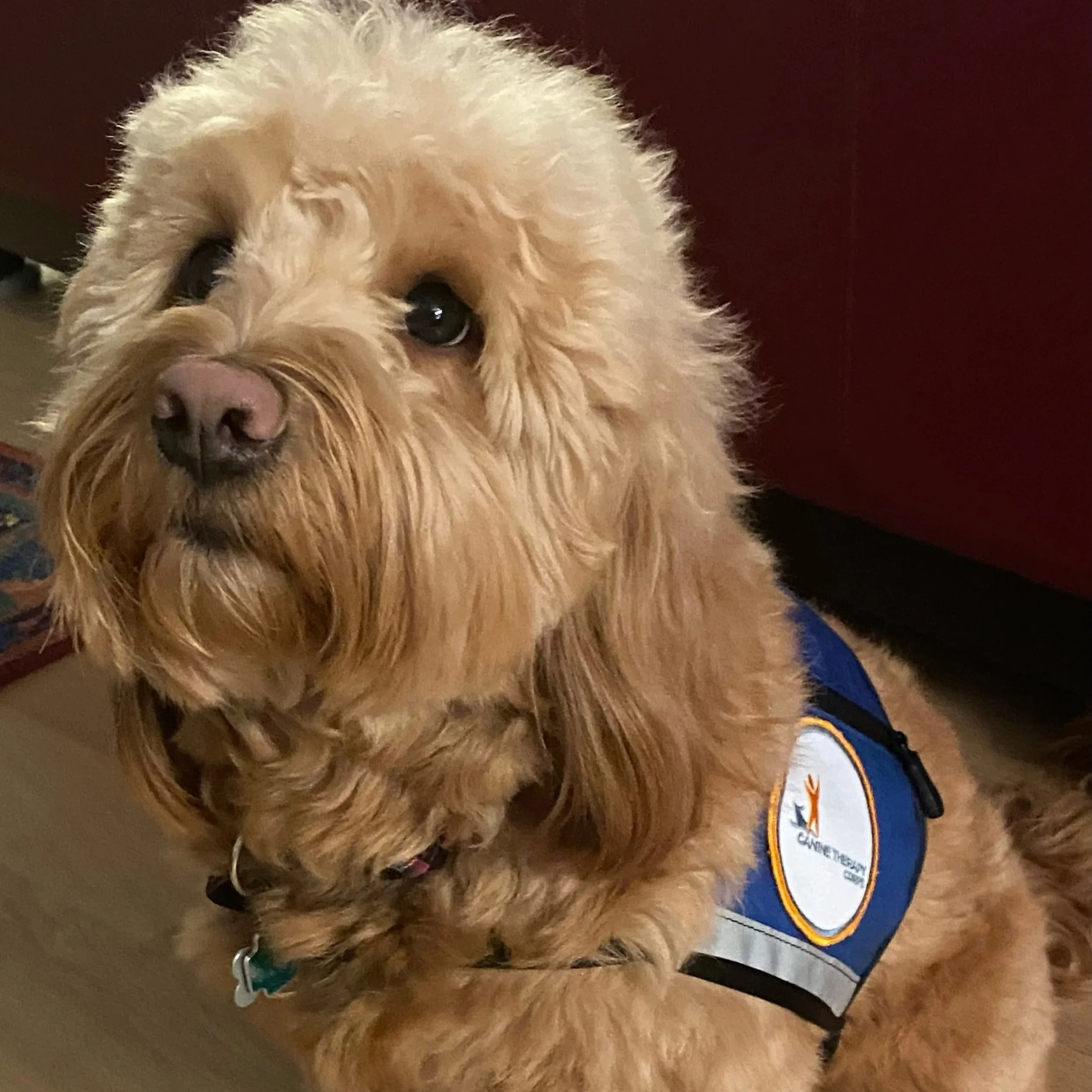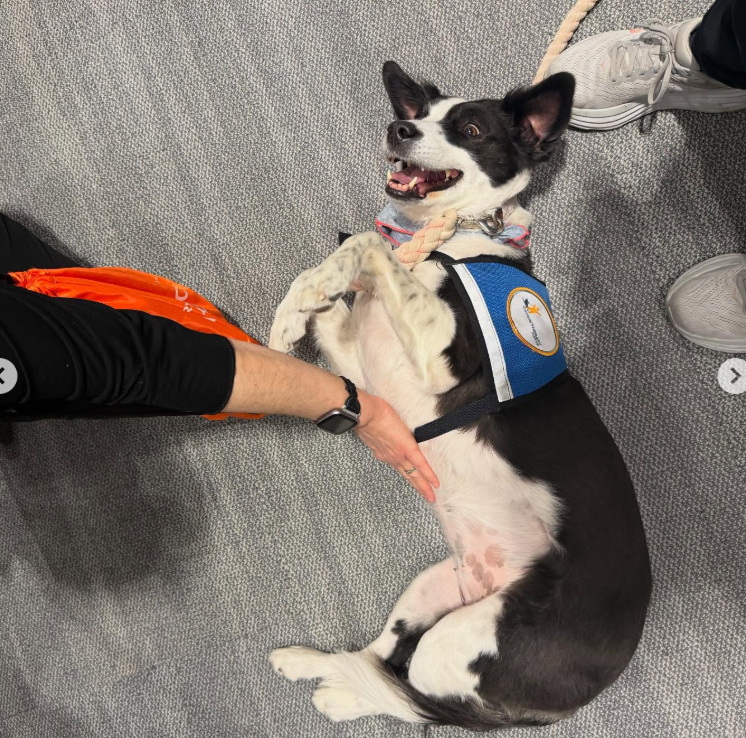OUR PROGRAMS
Canine Therapy Corps has approximately 90 active volunteer teams working in programs across the Chicago metropolitan area. Each year we provide over 1,400 hours of therapy to more than 5,000 individuals at no charge to and client or facility. We have many more volunteers without dogs who assist with our Certification test, evaluate our program efficacy, plan special events, and ensure that Canine Therapy Corps remains an innovative and exciting organization.
Rebekah Furgeson Recovery + Care Programs
The Rebekah Furgeson Recovery + Care Curriculum supports individuals’ efforts to heal and reclaim their lives.
This curriculum defines how Canine Therapy Corps serves people in these goal-directed, therapeutic programs.
Rebekah embraced the power of dogs to improve lives.
Therapy dogs (L to R): Daisy, Junebug, Levi and Cleo
HAYMArket CENTER
Canine Therapy Corps teams work with chemically dependent individuals in rehabilitation, some of whom are in residence as an alternative to serving jail time. The program follows our award-winning curriculum developed to improve communication skills, anger management, self-esteem and self-awareness. During this six-week program, participants work with the dogs on progressively advanced obedience and agility, culminating in a graduation where each participant demonstrates proficiency in dog handling. The program helps to break the cycle of crime, personal violence and neglect that often accompanies substance use.
Therapy dog Daisy works with veterans during this ten-week program.
JESSE BROWN VA MEDICAL CENTER
This psychosocial program is for veterans being treated for a myriad of mental illnesses, such as chronic post-traumatic stress disorder, severe depression, and other mental illnesses, at the hospital's outpatient psychosocial rehabilitation and recovery center. Simply stated, participants' work with our dogs is empowering. There are infinite parallels between successful dog handling and coping with life's peaks and valleys. In order to build a strong bond with a dog, one must be patient, consistent, flexible, and perseverant, but also caring, understanding, respectful, and fair. Each participant works with one therapy dog throughout the curriculum, using obedience and agility exercises, as well as trick training, to cultivate their relationship. Typically, when participants begin, they do not fully comprehend the inextricable link between their own behavior and therapy dog compliance. As the curriculum progresses, so, too, does participant impulse control, confidence, and perspective - key recovery components.
Therapy dog Rocko eagerly awaits instruction from participants.
LAWRENCE HALL
Canine Therapy Corps teams work with adolescents and teens with severe emotional and behavioral problems at this not-for-profit child welfare agency. The program follows our award-winning curriculum developed to improve communication skills, anger management, self-esteem and self-awareness. During this six-week program, participants work with the dogs on progressively advanced obedience and agility, culminating in a graduation where each participant demonstrates proficiency in dog handling.
Lydia Home
Canine Therapy Corps teams work with children ages 6-15 for this psychosocial program. These children are DCFS youth in care living in a residential treatment program that receive intensive behavioral and emotional therapy to be able to successfully reintegrate into a positive family environment. Similar to our UCAN and Lawrence Hall programs, this 6-week program follows a curriculum where participants work to improve communication skills, anger management, self-esteem and self-awareness. Participants work with the dogs on progressively advanced obedience and agility, culminating in a graduation where each participant demonstrates proficiency in dog handling.
Therapy dog Rocko helps participants learn impulse control, teamwork, self-esteem, and much more.
sonia shankman orthogenic school
This psychosocial program, Canine Therapy Corps teams serve children and adolescents facing emotional challenges and/or autism. The OSchool offers students a nurturing, supportive atmosphere, allowing them to break the cycle of repeated hospitalizations and preparing them to successfully transition to their home schools or colleges. During this 6-week program, students learn teamwork, dog handling, self-esteem, impulse control, and agility.
PHYSICAL THERAPY PROGRAMS
Shirley Ryan AbilityLab
Our program at this prestigious facility (formerly the Rehabilitation Institute of Chicago) works with clients of all ages who are recovering from head trauma, spinal cord injuries, burns and a variety of other catastrophic occurrences. Volunteer teams use agility equipment and other recreational techniques to motivate clients to improve mobility, strength, balance and the ability to lead independent, productive lives. This is the site of the published research study on the impact of animal-assisted therapy on ambulation.
Schwab Rehabilitation
Schwab Rehabilitation (Sinai Health System) provides comprehensive inpatient and outpatient rehabilitation services for adults and children. This physical rehabilitation program will be for inpatient adults and volunteers work one on one with participants and their physical therapist to help support and achieve their therapeutic goals.
Therapy dog Aija is all smiles as she assists rehabilitation participants at Swedish Hospital.
SWEDISH HOSPITAL
This program began in April 2006 as part of the Planetree Initiative for patient centered care. Canine Therapy Corps volunteers work with adult rehabilitation patients selected by the inpatient allied health supervisor from the general population of the inpatient census at the hospital. The goals of the program include increased functional balance, range of motion and upper extremity strength, increased mobility and endurance for increased independence, and to provide socialization opportunities while recovering from physical trauma. In addition, the program provides exercises to address cognitive and visual perceptual tasks.
AUTISM PROGRAMS
Therapy Dog Taro and his choice board wait for the kids at Easterseals Academy to arrive.
EASTERSEALS ACADEMY
This program, which started in January 2009, is designed to meet the varying needs of students on the autism spectrum. Goals include improving sensory processing skills, social and communication skills and memory, as well as activities for daily living and increased impulse control. CTCorps is proud to have developed a portfolio of proprietary materials for use in our programs for children with autism and other cognitive and developmental delays.
VISITATION PROGRAMS
Therapy dog Willow spreading joy to children and staff members at CCAC.
CHICAGO CHILDREN'S ADVOCACY CENTER
Chicago Children's Advocacy Center unites public, private, and community partners to ensure the health, safety, recovery, and well-being of abused children and provides a fully integrated approach to dealing with abuse, making reporting and treatment as simple as possible for victims. Our volunteers visit with children, who have suffered sexual abuse and assault, to reduce stress and anxiety while they await appointments with treating professionals.
HEARTLAND HUMAN CARE SERVICES
Therapy dogs visit with DCFS youth in care residing at a residential facility. These youth have a nonviolent criminal history and have been exposed to high levels of stress and trauma. Canine Therapy Corps dog teams provide a welcome respite for the youth while they are away from their families, giving them a sense of comfort and friendship.
Nettlehorst school
At Nettelhorst, the therapy dogs from Canine Corps play a meaningful role in supporting students’ emotional well-being. Their visits bring joy, connection, and a sense of safety, giving students a gentle break from the demands of academics. By simply being present, the therapy dogs help students reset, refocus, and return to learning with a renewed sense of ease and confidence
Ida crown jewish academy
At this program, volunteers visit with students at Ida Crown Jewish Academy in Skokie. This partnership plays a valuable role in supporting students’ mental health by creating a calming environment that encourages openness, reduces stress, and helps normalize conversations about emotional well-being.
JCFS Knapp School and Yeshiva
Therapy dogs visit with students in 2nd-5th grade at a weekly group at Knapp School, a therapeutic day school in Chicago. This group is co-led by a social worker, speech therapist, and two special education teachers and focuses on Social-Emotional Learning, including developing skills such as identifying and expressing emotions, as well as developing positive coping strategies to manage school and life stressors. The group also focuses on social dynamics, including practicing appropriate peer interactions, discussing qualities of friendship, and sharing with others. The presence of a therapy dog provides comfort to the students that attend this group.
Office of Emergency Management and Communications-City of Chicago
Canine Therapy Corps volunteers work with the Office of Emergency Management and Communications to offer stress relief and a sense of comfort to the 9-1-1 call takers and dispatchers of the city of Chicago. The presence of trained therapy dogs significantly improves the environment of the 9-1-1 call center by providing emotional support to call takers and dispatchers who often experience high-stress situations. During short breaks, the 9-1-1 call takers and dispatchers can interact with therapy dogs, helping to reduce anxiety, lower stress levels, boost mental clarity and focus, and improve overall morale.
NORTHWESTERN MEMORIAL HOSPITAL
Volunteer teams visit inpatients and outpatients in a variety of departments. Some of these patients have been hospitalized or even bedridden for weeks or months, and the presence of a dog brings great comfort to these individuals during a very trying time in their lives. We regularly visit a number of floors at the facility, and in addition we accommodate special visits requested by family members, social workers, and the patients themselves.
Ronald Mcdonald house charities
Ronald McDonald House Charities provides housing, support and community so families with sick children can stay together. Our therapy dog teams offer emotional comfort, reducing stress, and bringing moments of joy and normalcy to families during challenging times.
Rush Children’s Hospital
Volunteer teams facilitate pet therapy visits for inpatients and outpatients in various pediatric spaces at our hospital. Participating in a visit with a dog (coming to their hospital room!) brings some fun to the hospital setting, and promotes many positive outcomes for kids and families-including fostering relaxation, creating a more positive mood or affect, and even increasing engagement in their hospital experience.
